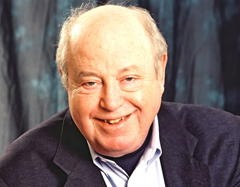2015 Monie A. Ferst Award
 Professor Charles A. Eckert obtained B.S. and M.S. degrees from the Massachusetts Institute of Technology and his Ph.D. from the University of California at Berkeley. After appointment as a NATO postdoctoral fellow at the Centre National de la Recherche Scientifique in France, he joined the chemical engineering faculty at the University of Illinois. He rose through the academic ranks and served as department head at Illinois before moving to Georgia Tech in 1989 as the J. Erskine Love Institute Chair in Engineering and Professor of Chemical and Biomolecular Engineering at the Georgia Institute of Technology. His many awards include: National Academy of Engineering, Fellow of the American Association for the Advancement of Science and of the American Institute of Chemical Engineers (AIChE), three major awards from AIChE (Clarence Gerhold Award, William H. Walker Award, and the Alan P. Colburn Award), two major awards from the American Chemical Society (E.V. Murphree Award and the Ipatieff Prize), and the State of Georgia Regents’ Research in Undergraduate Education Award.
Professor Charles A. Eckert obtained B.S. and M.S. degrees from the Massachusetts Institute of Technology and his Ph.D. from the University of California at Berkeley. After appointment as a NATO postdoctoral fellow at the Centre National de la Recherche Scientifique in France, he joined the chemical engineering faculty at the University of Illinois. He rose through the academic ranks and served as department head at Illinois before moving to Georgia Tech in 1989 as the J. Erskine Love Institute Chair in Engineering and Professor of Chemical and Biomolecular Engineering at the Georgia Institute of Technology. His many awards include: National Academy of Engineering, Fellow of the American Association for the Advancement of Science and of the American Institute of Chemical Engineers (AIChE), three major awards from AIChE (Clarence Gerhold Award, William H. Walker Award, and the Alan P. Colburn Award), two major awards from the American Chemical Society (E.V. Murphree Award and the Ipatieff Prize), and the State of Georgia Regents’ Research in Undergraduate Education Award.
Throughout his academic career, Professor Eckert has been committed to both excellent teaching and research. Indeed, he has emphasized how these often-separated activities come together to stimulate undergraduates and graduate students to learn their chosen field of study and to explore new horizons. More than 100 graduate students have received their Ph.D. under his guidance. Many have of these have inspired a subsequent generations of students after entering their own academic careers.
Most of Professor Eckert’s research has been related to separations, and use of supercritical fluids in separation processes is among his most notable field of study. Indeed, he was among the first to recognize the potential of supercritical fluids as solvents and has been a leader in this field for more than 30 years. Notably, a sizable number of the supercritical-fluid community consists of his former collaborators or students, including many academic leaders, members of one of National Academy of Engineering, and several in Europe and Australia.
In part of his early research, Professor Eckert and his students designed new experimental techniques for measuring solubilities and partial molar volumes. They developed perturbed hard-sphere and lattice-gas models for data correlation and prediction and introduced the concept of local-density and local-composition augmentation to explain many of the unique properties of supercritical fluids. This led to use of supercritical fluids as solvents in which to carry out chemical reactions, thereby replacing undesirable solvents, augmenting mass transfer, facilitating solvent removal, and enhancing product yield and selectivity. Professor Eckert and his group also have exploited the unique properties of near-critical fluids, both for separations and reactions.
In addition to developing new processing techniques, Professor Eckert and his colleague Professor Charles Liotta have been instrumental in applying supercritical fluid technology to environmental remediation and waste minimization. They identified and designed applications ranging from replacement of incineration by wet oxidation to benign regeneration of carbon adsorbents for water treatment. They were the first to run phase-transfer catalysis for heterogeneous reactions in supercritical fluids, where use of CO2 permits replacement of environmentally undesirable solvents, facilitates both mass transfer and solvent removal, and leads to optimization of selectivity. This work led to their joint selection for the Presidential Green Chemistry Challenge Award.